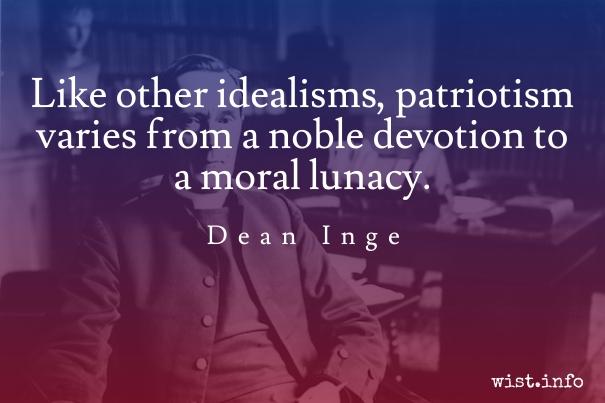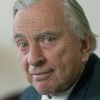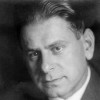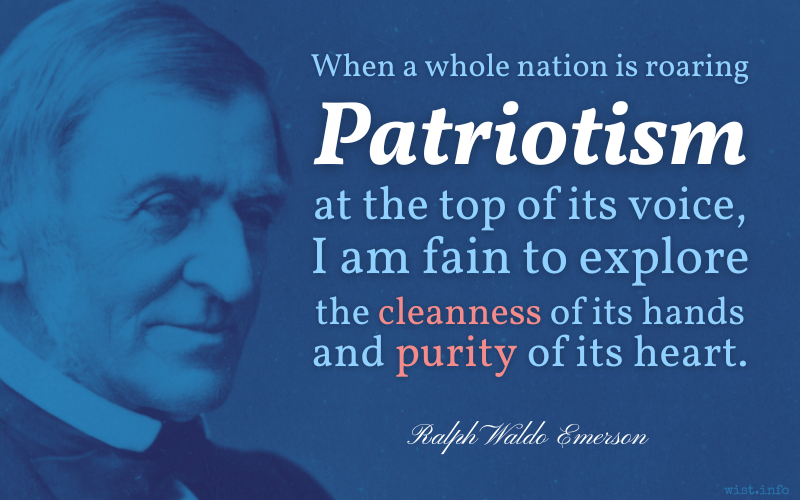Quotations about:
nationalism
Note not all quotations have been tagged, so Search may find additional quotes on this topic.
“It looks to me,” he went on in a melancholy tone, “as if they was too much noise an’ smoke about pathritism in America f’r the good ib th’ country.”
Finley Peter Dunne (1867-1936) American humorist and journalist
“Freedom and the Fourth of July” (1897)
(Source)
Nations, like individuals, wish to enjoy a fair reputation. It is therefore desireable for us that the slanders on our country, disseminated by hired or prejudiced travellers, should be corrected. But politics, like religion, hold up the torches of martyrdom to the reformers of error.
Thomas Jefferson (1743-1826) American political philosopher, polymath, statesman, US President (1801-09)
Letter to James Ogilvie (4 Aug 1811)
(Source)
The average “educated” American has been made to believe that, somehow, the United States must lead the world even though hardly anyone has any information at all about those countries we are meant to lead. Worse, we have very little information about our own country and its past.
The lack of objectivity, as far as foreign nations are concerned, is notorious. From one day to another, another nation is made out to be utterly depraved and fiendish, while one’s own nation stands for everything that is good and noble. Every action of the enemy is judged by one standard — every action of oneself by another. Even good deeds by the enemy are considered a sign of particular devilishness, meant to deceive us and the world, while our bad deeds are necessary and justified by our noble goals, which they serve.
Erich Fromm (1900-1980) American psychoanalyst and social philosopher
The Art of Loving, ch. 5 (1956)
(Source)
National character is only another name for the particular form which the littleness, perversity, and baseness of mankind take in every country. If we become disgusted with one, we praise another, until we get disgusted with this too. Every nation mocks at other nations, and all are right.
[Dem Nationalcharakter wird, da er von der Menge redet, nie viel Gutes ehrlicherweise nachzurühmen sein. Vielmehr erscheint nur die menschliche Beschränktheit, Verkehrtheit und Schlechtigkeit in jedem Lande in einer andern Form und diese nennt man den Nationalcharakter. Von einem derselben degoutirt loben wir den andern, bis es uns mit ihm eben so ergangen ist. — Jede Nation spottet über die andere, und alle haben recht.]
Arthur Schopenhauer (1788-1860) German philosopher
Parerga and Paralipomena, Vol. 1, “Aphorisms on the Wisdom of Life [Aphorismen zur Lebensweisheit],” ch. 4 “Position, or a Man’s Place in the Estimation of Others [Von dem, was einer vorstellt]” (1851) [tr. Saunders (1890), 4.2]
(Source)
(Source (German)). Alternate translation:
Since national character speaks of the crowd, not much good will ever be honestly said in its favour. On the contrary, we see in a different form in each country only human meanness, perversity, and depravity, and this is called national character. Having become disgusted with one of them, we praise another until we become just as disgusted with it. Every nation ridicules the rest and all are right.
[tr. Payne (1974), ch. 4 "What a Man Represents"]
All nationalists have the power of not seeing resemblances between similar sets of facts. A British Tory will defend self-determination in Europe and oppose it in India with no feeling of inconsistency. Actions are held to be good or bad, not on their own merits, but according to who does them, and there is almost no kind of outrage — torture, the use of hostages, forced labour, mass deportations, imprisonment without trial, forgery, assassination, the bombing of civilians — which does not change its moral colour when it is committed by ‘our’ side.
George Orwell (1903-1950) English writer [pseud. of Eric Arthur Blair]
“Notes on Nationalism” (May 1945)
(Source)
Nationalism is not to be confused with patriotism. Both words are normally used in so vague a way that any definition is liable to be challenged, but one must draw a distinction between them, since two different and even opposing ideas are involved. By “patriotism” I mean devotion to a particular place and a particular way of life, which one believes to be the best in the world but has no wish to force upon other people. Patriotism is of its nature defensive, both militarily and culturally. Nationalism, on the other hand, is inseparable from the desire for power. The abiding purpose of every nationalist is to secure more power and more prestige, not for himself but for the nation or other unit in which he has chosen to sink his own individuality.
George Orwell (1903-1950) English writer [pseud. of Eric Arthur Blair]
“Notes on Nationalism” (May 1945)
(Source)
Nationalism appeals to our tribal instincts, to passion and to prejudice, and to our nostalgic desire to be relieved from the strain of individual responsibility which it attempts to replace by a collective or group responsibility.
By “nationalism” I mean first of all the habit of assuming that human beings can be classified like insects and that whole blocks of millions or tens of millions of people can be confidently labeled “good” or “bad.” But secondly — and this is much more important — I mean the habit of identifying oneself with a single nation or other unit, placing it beyond good and evil and recognizing no other duty than that of advancing its interests.
George Orwell (1903-1950) English writer [pseud. of Eric Arthur Blair]
“Notes on Nationalism” (May 1945)
(Source)
One of the greatest attractions of patriotism — it fulfills our worst wishes. In the person of our nation we are able, vicariously, to bully and cheat. Bully and cheat, what’s more, with a feeling that we are profoundly virtuous. Sweet and decorous to murder, lie, torture for the sake of the fatherland.
Aldous Huxley (1894-1963) English novelist, essayist and critic
Eyeless in Gaza, ch. 17 (1922)
(Source)
I regret that I am not clear as to what you intend by arisch. I am not of Aryan extraction: that is Indo-Iranian; as far as I am aware none of my ancestors spoke Hindustani, Persian, Gypsy, or any related dialects. But if I am to understand that you are enquiring whether I am of Jewish origin, I can only reply that I regret that I appear to have no ancestors of that gifted people. My great-great-grandfather came to England in the eighteenth century from Germany: the main part of my descent is therefore purely English, and I am an English subject — which should be sufficient. I have been accustomed, nonetheless, to regard my German name with pride, and continued to do so throughout the period of the late regrettable war, in which I served in the English army. I cannot, however, forbear to comment that if impertinent and irrelevant inquiries of this sort are to become the rule in matters of literature, then the time is not far distant when a German name will no longer be a source of pride.
J.R.R. Tolkien (1892-1973) English writer, fabulist, philologist, academic [John Ronald Reuel Tolkien]
Letter to Rütten & Loening Publishing (1938-07-25)
(Source)
In response to the inquiry by a German publishing house about his ancestry, prior to their releasing a German-language edition of The Hobbit. Tolkien drafted two letters to Stanley Unwin, his agent. Unwin forwarded the other one, which refused to answer the question at all.
The Hobbit did not appear in German until 1957.
Perhaps travel cannot prevent bigotry, but by demonstrating that all peoples cry, laugh, eat, worry, and die, it can introduce the idea that if we try and understand each other, we may even become friends.
Maya Angelou (1928-2014) American poet, memoirist, activist [b. Marguerite Ann Johnson]
Wouldn’t Take Nothing for My Journey Now, ch. 2 “Passports to Understanding” (1993)
(Source)
The difference between patriotism and nationalism is that the patriot is proud of his country for what it does, and the nationalist is proud of his country no matter what it does; the first attitude creates a feeling of responsibility, but the second a feeling of blind arrogance that leads to war.
Patriotism is proud of a country’s virtues and eager to correct its deficiencies; it also acknowledges the legitimate patriotism of other countries, with their own specific virtues. The pride of nationalism, however, trumpets its country’s virtues and denies its deficiencies, while it is contemptuous toward the virtues of other countries. It wants to be, and proclaims itself to be, “the greatest,” but greatness is not required of a country; only goodness is.
On the other hand, the cheapest form of pride is national pride; for the man affected therewith betrays a want of individual qualities of which he might be proud, since he would not otherwise resort to that which he shares with so many millions. The man who possesses outstanding personal qualities will rather see most clearly the faults of his own nation, for he has them constantly before his eyes. But every miserable fool, who has nothing in the world whereof he could be proud, resorts finally to being proud of the very nation to which he belongs. In this he finds compensation and is now ready and thankful to defend, “tooth and nail,” all the faults and follies peculiar to it.
[Die wohlfeilste Art des Stolzes hingegen ist der Nationalstolz. Denn er verrät in dem damit Behafteten den Mangel an individuellen Eigenschaften, auf die er stolz sein könnte, indem er sonst nicht zu dem greifen würde, was er mit so vielen Millionen teilt. Wer bedeutende persönliche Vorzüge besitzt, wird vielmehr die Fehler seiner eigenen Nation, da er sie beständig vor Augen hat, am deutlichsten erkennen. Aber jeder erbärmliche Tropf, der nichts in der Welt hat, darauf er stolz sein könnte, ergreift das letzte Mittel, auf die Nation, der er gerade angehört, stolz zu sein. Hieran erholt er sich und ist nun dankbarlich bereit, alle Fehler und Torheiten, die ihr eigen sind, mit Händen und Füßen zu verteidigen.]
Arthur Schopenhauer (1788-1860) German philosopher
Parerga and Paralipomena, Vol. 1, “Aphorisms on the Wisdom of Life [Aphorismen zur Lebensweisheit],” ch. 4 “From What One Imagines [Von dem, was einer vorstellt]” (1851) [tr. Payne (1974)]
(Source)
(Source (German)). Alternate translation:
The cheapest sort of pride is national pride; for if a man is proud of his own nation, it argues that he has no qualities of his own of which he can be proud; otherwise he would not have recourse to those which he shares with so many millions of his fellowmen. The man who is endowed with important personal qualities will be only too ready to see clearly in what respects his own nation falls short, since their failings will be constantly before his eyes. But every miserable fool who has nothing at all of which he can be proud adopts, as a last resource, pride in the nation to which he belongs; he is ready and glad to defend all its faults and follies tooth and nail, thus reimbursing himself for his own inferiority.
[tr. Saunders (1890)]
The cheapest form of pride however is national pride. For it betrays in the one thus afflicted the lack of individual qualities of which he could be proud, while he would not otherwise reach for what he shares with so many millions. He who possesses significant personal merits will rather recognise the defects of his own nation, as he has them constantly before his eyes, most clearly. But that poor beggar who has nothing in the world of which he can be proud, latches onto the last means of being proud, the nation to which he belongs to. Thus he recovers and is now in gratitude ready to defend with hands and feet all errors and follies which are its own.
[Source]
When religion becomes a mere artificial façade to justify a social or economic system — when religion hands over its rites and language completely to the political propagandist, and when prayer becomes the vehicle for a purely secular ideological program, then religion does tend to become an opiate. It deadens the spirit enough to permit the substitution of a superficial fiction and mythology for the truth of life. And this brings about the alienation of the believer, so that his religious zeal becomes political fanaticism. His faith in God, while preserving its traditional formulas, becomes in fact faith in his own nation, class or race. His ethic ceases to be the law of God and love, and becomes the law of might-makes-right: established privilege justifies everything. God is the status quo.
I confess I am a little cynical on some topics, and when a whole nation is roaring Patriotism at the top of its voice, I am fain to explore the cleanness of its hands and purity of its heart.
Each nation knowing it has the only true religion and the only sane system of government, each despising all the others, each an ass and not suspecting it.
“My Country, right or wrong” is a thing no patriot would think of saying except in a desperate case. It is like saying, “My mother, drunk or sober.”
Gilbert Keith Chesterton (1874-1936) English journalist and writer
The Defendant, ch. 16 “A Defence of Patriotism”
(Source)





















